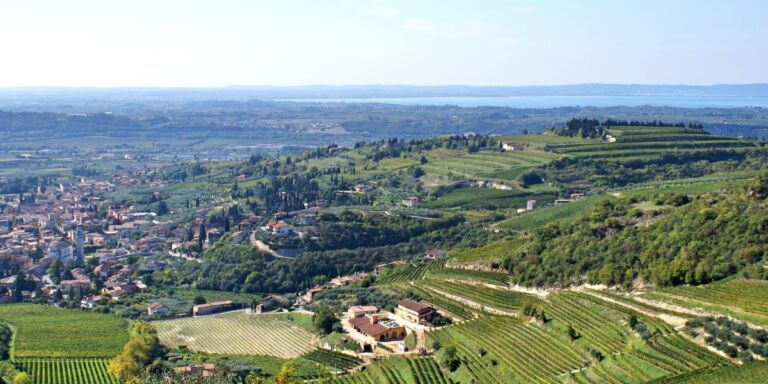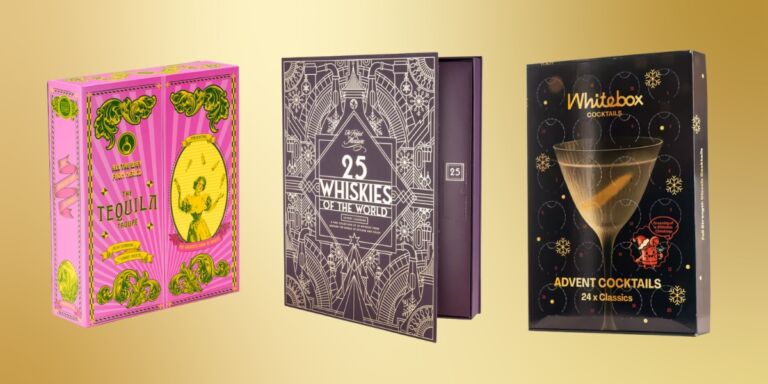Monterey pines shiver in the sea breeze, protecting rows of Chardonnay ripening in the late afternoon sun. But this isn’t California’s Central Coast; this is the UK. Or, to be more precise, the Isles of Scilly, a magical archipelago made up of more than 140 islands, only five of which are inhabited, 28 miles south-west of Cornwall’s Land’s End. Welcome to the UK’s most southerly vineyard.
Amid all the accolades accorded to English wine, it’s fair to say that the Scilly Isles has not been at the fore. There are, in fact, only two producers on the islands. One, St Martin’s Vineyard, which grows varieties such as Orion, was recently taken over by a young couple from the Midlands. The other, Holy Vale Vineyard, is set on the largest island, St Mary’s, and grows Chardonnay, Pinot Noir and Pinot Gris. It is owned by Robert Francis, proprietor of The Star Castle Hotel.
As I sip the newly released 2019 Holy Vale Vineyard Chardonnay-Pinot Gris blend, with its appley freshness, pleasing salty seam and honeyed melon finish, I’m wondering whether, with its mild, warm climate and enviable hours of sunshine, Scilly might be a new frontier for the English wine scene?

“It’s not been quite the unremitting success story you might think it might be,” confesses Francis, with refreshing candour. When the sun isn’t blazing and the sea isn’t tranquil, it’s often blowing a hooley on Scilly, with the full might of the Atlantic roaring on shore. When it rains, it rains – mildew is a major issue. And don’t talk to Francis about the birds. The Isles of Scilly might be steeped in birding folklore, with migrants and vagrants galore, but it’s a challenge for the vineyard owner, as their feathered friends love a ripe grape. Birds devasted his crop three years in a row, so now Francis has to net all 6,500 vines, spread over seven acres, on three main parcels.
As a result of all these challenges, Francis has only released wines from two vintages, commercially, since he started bottling in 2014, each yielding small amounts of wine. But he’s proud of that recently released white blend, and excited about the new Pinot Noir, which he’s just finishing now – I catch him just before racking – and also has plans for a single-varietal Chardonnay.
As well as planting, pruning and picking, Francis makes the wine, too – with a little help from Austrian wine legend Willi Opitz (more of whom later). He has no wine dynasty or degree to draw upon – save a week’s crash course at Plumpton College. Instead, Francis can only claim a passion for wine, developed in his twenties while working at the family hotel in Mullion, Cornwall, after meeting Rhône specialist and regular guest John Livingstone-Learmonth.
“I’d never planted anything before this. I’ve been a fisherman and lifeboatman all my life – I’ve got saltwater under my fingernails,” laughs the 68-year-old.


Francis fell in love with the Isles of Scilly in the 1970s, deciding that one day he would build a hotel there. And thanks to banks flashing the cash in the 1980s, he did just that – only to lose it five years later, along with the family hotel in Cornwall, when the bank went bust during a recession. It took another decade or so to make his way back, with an opportunity to first run, and then buy the 38-bedroom, 16th-century Star Castle Hotel, located on the highest point of St Mary’s, overlooking the harbour and set within its original garrison walls. Not surprisingly, it’s one of the top places to stay on Scilly.
Things have gone well for Francis since then, with the hotel gaining glowing reviews and proving a draw for wine and food lovers lured by its stunning location and great-value wine list packed full of gems with low mark-ups (also available at retail to locals through Holy Vale). Foodies love the castle’s ‘one-mile menu’, ingredients appealingly plucked from their own kitchen garden, from nearby growers, and by Francis from the sea.
The winery is basic, housed in an old barn, with holes in the roof and minimal kit
Six years after opening, he felt it was time to invest in the business further and leave the day-to-day running of the hotel to his oldest son, James. Fuelled by his love of wine, he realised his dream to grow vines on Scilly’s redundant farmland, “begging, stealing and borrowing” various parcels – ultimately from the Duchy of Cornwall, which owns pretty much all of Scilly.
Francis turned to celebrated Cornish winemaker Bob Lindo of Camel Valley vineyard for help. “He told me that growing vines on St Mary was at best marginal, which wasn’t very encouraging. He also advised I stick to Germanic varieties, such as Rondo, but they’ve never done anything for me. I wanted to make something that people – me – are really going to enjoy, namely my favourite grape, Pinot Noir, and Chardonnay.”

Around 60% of his vines are Pinot Noir, with 30% Chardonnay, and 10% Pinot Gris, which he planted on a hunch. He talked to Yorkshire-based The Vine House about the best clones suited for coastal locations, who sourced plants for him from Burgundy and Luxembourg, and he persuaded a former employee of Lindo’s to help him set out the vineyard.
Cue Opitz. The legendary Austrian winemaker has been a pal for many years, first meeting Francis at a wine dinner, then selling him wine. When Francis told him he had planted some vines, Opitz offered to help, joining him for his first harvest in 2014, and then jumping on the phone for any queries with subsequent harvests, which range from correcting sulphur levels to helping him rescue wayward fermentations (Francis once spent a frantic 48 hours bringing down the temperature of his Chardonnay with endless buckets of ice).

The winery is basic, housed in an old barn, with holes in the roof and minimal kit, but what it lacks in tech it makes up for in charm, prompting the late wine writer Michael Broadbent, a regular visitor to the castle, to declare it one of the most beautiful vineyard sites in the world.
Scilly has plenty more surprises up its sleeve. Alongside the unblemished beaches and fields filled with dancing narcissi is a burgeoning artisanal food scene, from Troytown Farm’s luscious, ice cream and Veronica Farm’s moreish fudge, to Island Bakery’s organic bread. There are also no less than three distilleries across the islands, two making gin – Westward Farm and Scilly Spirit, which runs a gin school – plus a new rum and vodka distillery, SC Dogs.
Then there’s that aforementioned ‘one-mile lobster lunch’, also served at Holy Vale vineyard, with the white wine made specifically to match. It’s taken at tables surrounded by vines in a lush valley within sniffing distance of the sea and a short stroll from pristine white beaches. It might be a fledgling scene, but it’s already wine-tourism gold.







